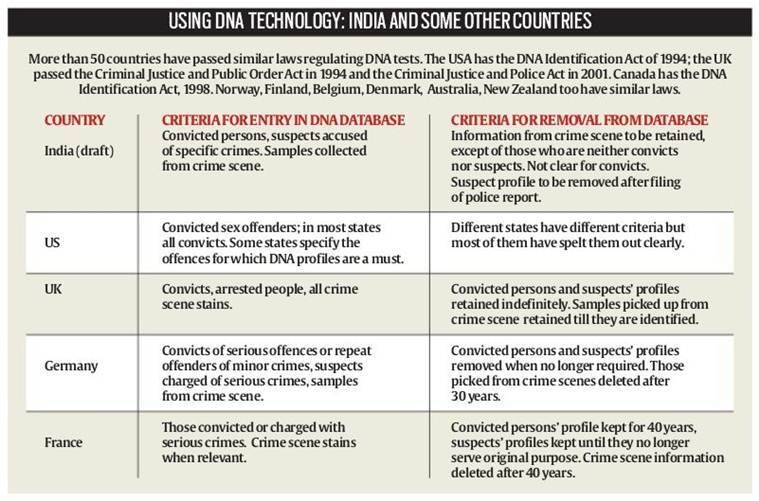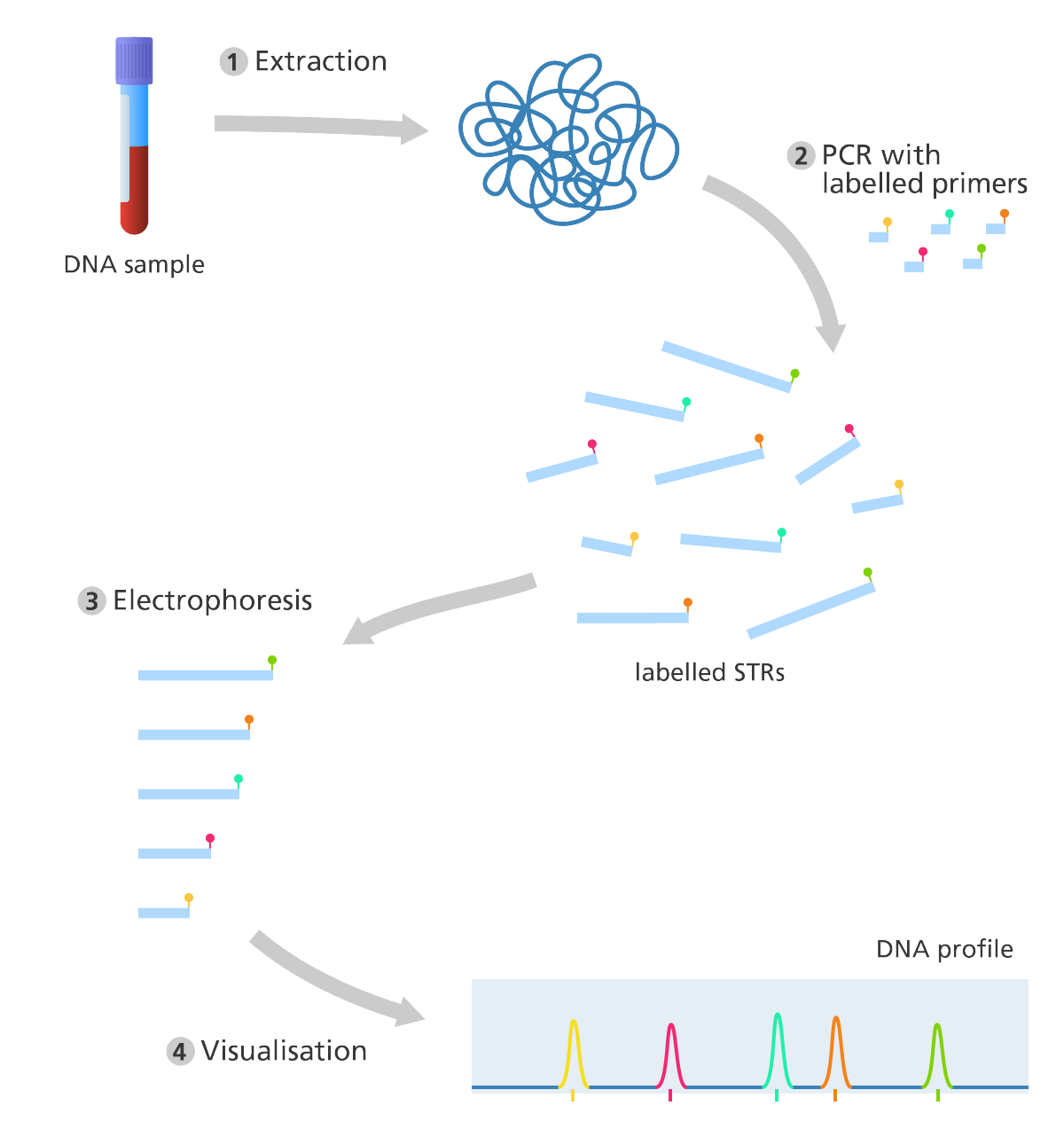
In News:
Recently, the Parliamentary Standing Committee on Science and Technology, Environment, Forests and Climate Change has recommended that the government should ease the concerns raised over the DNA Technology (Use and Application) Regulation Bill, 2019.
- The committee consulted legal and forensic science experts, apart from the Internet Freedom Foundation, National Law University, among others.
Background:
- The Bill was proposed in 2003 for the first time and since then it has gone through several revisions, by both the Department of Biotechnology and Law Ministry.
- The Department of Biotechnology has argued that nearly 60 countries have enacted similar legislation and that all-important matters related to privacy, confidentiality and data protection have been taken into account.
- In July 2019, it was again introduced in the Lok Sabha and after being passed, was referred to the Committee in October 2019.
Highlights of the Bill:
- Database Creation:
- It aims to establish a database of “certain categories of persons” such as victims of crimes, missing persons and children, unidentified bodies, as well as offenders, suspects and undertrials in cases.
- Such a database would help trace repeat offenders of heinous crimes such as rape and murder through DNA profiling.
- It aims to establish a database of “certain categories of persons” such as victims of crimes, missing persons and children, unidentified bodies, as well as offenders, suspects and undertrials in cases.
- Regulation of DNA Technology:
- It regulates the use of DNA technology for establishing the identity of persons in respect of matters listed in a Schedule.
- These include criminal matters such as offences under the Indian Penal Code, 1860, and civil matters such as parentage disputes, emigration or immigration, and transplantation of human organs.
- It regulates the use of DNA technology for establishing the identity of persons in respect of matters listed in a Schedule.
- National DNA Data Bank:
- It establishes a National DNA Data Bank and Regional DNA Data Banks, which will maintain the following indices:
- Crime scene index.
- Suspects’ or undertrials’ index.
- Offenders’ index.
- Missing persons’ index.
- Unknown deceased persons’ index.
- It establishes a National DNA Data Bank and Regional DNA Data Banks, which will maintain the following indices:
- DNA Regulatory Board:
- It also establishes a DNA Regulatory Board and every DNA laboratory that analyses a DNA sample to establish the identity of an individual, has to be accredited by the Board.
- Requirement of Consent:
- Written consent by individuals is required to collect DNA samples from them. Consent is not required for offences with a punishment of more than seven years of imprisonment or death.
- Removal of DNA Profiles:
- It provides for the removal of DNA profiles of suspects on filing of a police report or court order, and of undertrials on the basis of a court order.
- Profiles in the crime scene and missing persons’ index will be removed on a written request.
Benefits of DNA Profiling and the Bill:
- Through DNA profiling techniques, crimes can be easily solved which will help to nab criminals.
- The technique is very effective in identifying accident victims, missing people or identifying disaster victims.
- The identification of parents is also possible with the use of the DNA profiling, which would prove helpful in property disputes.
- As per the National Crime Records Bureau, annually 1,00,000 children go missing and the Bill will enable identification of missing children.
- The standards of the DNA testing laboratories are not monitored or regulated, in absence of any proper regulation so it will be helpful in this regard.
- The Bill will also help in identifying unidentified deceased, including disaster victims and apprehend repeat offenders for crimes such as rape and murder.
Concerns Raised:
- The data stored in the various indices of the DNA Data Bank could be misused to target segments of society based on religion, caste, etc., if gone into the wrong hands.
- In a blind crime or a crime involving a large number of persons (such as a riot) everybody is suspect, without any real basis.
- It means that thousands of persons can be subjected to DNA profiling on a mere suspicion.
- A crime scene could also hold DNA of someone who was not present at or nearby it because “bodily material like hair could be transported to the crime scene accidentally by a variety of ways.” These DNA profiles could find their way into the ‘crime scene index’ of the national databank.
- Provisions of the Bill would lead to violations of the Right to Privacy and will cause irreversible damage to individuals’ right to privacy as well as the criminal justice system.
- Without adequate statutory safeguards, the Bill could prove problematic particularly for marginalised communities, including Dalits, Adivasis and religious and gender minorities.
- Concerns regarding caste profiling as well as the use of collected information for targeted discrimination of specific groups.
- There are concerns on not creating separate data banks for civil and criminal matters.
- This will result in a presumption against the person, even though they have not consented to giving their DNA sample for use in the criminal investigation.
Recommendations:
- The concerns regarding the Bill are not entirely unfounded and have to be recognised and addressed by Parliament.
- An enabling ecosystem must be created to ensure that DNA profiling is done in a manner that is fully consistent with various Supreme Court judgments and with the Constitution.
- Justice K S Puttaswamy (Retd) vs Union Of India, 2018: The SC held that right to privacy was a constitutionally protected fundamental right under Articles 14, 19 and 21.
- On ‘DNA profiles finding a way to the index’, the panel suggests that these should be used only for investigation but not put in a databank.
- Also, these DNA profiles should be destroyed once a trial is over, barring those of the convicted.
- Strongly recommends only one National Data Bank in order to minimise chances of misuse of data.
- The DNA Regulatory Board should be independent and not consist of fully serving government officials.
- DNA samples should be taken only with the consent of an individual and no person should be forced to provide evidence that may incriminate him/her in any crime.

|
DNA Profiling
|
Previous article
Discovery Of India’s First Ever Lithium Reserves
Next article
Lethal Guinea Pig Test Scrapped
